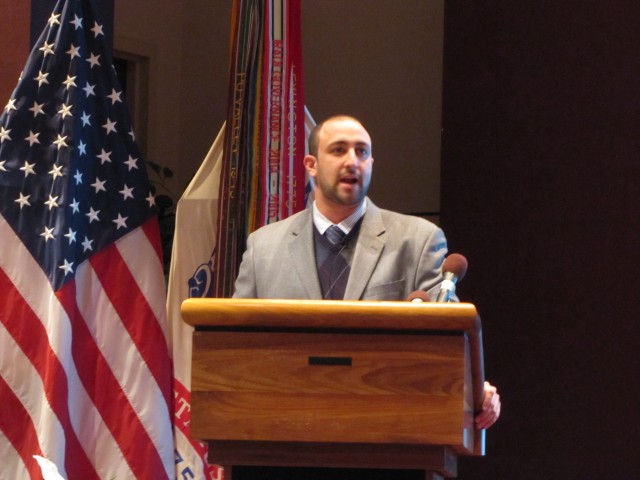
REDSTONE ARSENAL, Ala. -- The threat of the nation's homegrown terrorist movement came into full view Feb. 23 during a Space and Missile Defense Command security awareness briefing by a spokesman for the world's most comprehensive data center on radical Islamic terrorist groups.
Flashing picture after picture of alleged terrorists representing various radical Islamic groups on a large projection screen, Stephen Landman of The Investigative Project on Terrorism told his audience that there are several "homegrown extremists and radical terrorists" in the U.S. who encourage terrorism throughout the world, and who actively recruit and raise funds for terrorist groups.
The IPT is a research group founded by internationally recognized terrorism and national security expert Steven Emerson. It investigates the operations, funding, activities and front groups of Islamic terrorist and extremist groups in the U.S. and around the world.
Landman spoke on "American Jihad: Radicalization and Islamic Extremism in the U.S." during SMDC's Security Awareness Day held in Bob Jones Auditorium.
The IPT has identified the patterns of radicalization that are common among terrorists. Those patterns include pre-radicalization, self identification, indoctrination and jihadization.
"The vehicles for radicalization are gateway groups, mosques and the Internet," Landman said.
The IPT has identified gateway groups - such as the Global Relief Foundation, Islamic Committee for Palestine, Muslim Public Affairs Council, Council on American-Islamic Relations and the front group known as the Holy Land Foundation - as groups associated with terrorism and the encouragement of terrorist acts. In addition, it has identified several Internet websites involved in encouraging terrorism and cyber-based terrorism, and mosques where Muslim men are being radicalized.
"Not all mosques are associated with terrorism," Landman said. "But some have been identified. There is radical preaching going on at them."
The message of these radicalization avenues are that "the U.S. is engaged in a war against Islam rather than fighting against terrorist groups," he said, adding that those involved in these avenues are often subjected to "virulent anti-American statements."
These three avenues are used to circulate propaganda, plan terrorist attacks and finance terrorist organizations.
The Internet is a powerful terrorist tool as "virtually all foreign terrorist organizations are online," Landman said. "Manuals and videos are on the Internet. There are virtual terrorist training camps and Internet sites that show how to make bombs out of remote cars and other common items.
"The Internet is probably one of the biggest threats facing us in the next decade."
In terms of domestic radicalization, Landman outlined common factors found among U.S. radicals and terrorists. Those factors include: male Muslims under the age of 35 (average age is 27), children of immigrants from the Middle East or Southeast Asia, middle class background and higher education.
In his comments, Landman pointed out the examples of four domestic terrorist groups: the Northern Virginia 5, Lackawanna Six, Virginia Paintball Jihad and the Al-Amriki/Al-Shababb, Minn. Somalis.
"The Northern Virginia 5 is the most recent," Landman said of the Washington, D.C.-based group that was arrested in December 2009.
"We don't know exactly how they were radicalized. But we do know they met on the Internet and in the classroom. They flew from D.C. to Pakistan because they wanted to attend a training camp. They were eventually picked up by the Pakistanis. They say they were not engaging in terrorism, they were engaging in Jihad (a religious duty in the holy war on behalf of Islam). To them, Jihad is not terrorism."
Lackawanna Six, formed in Lackawanna, N.Y., were arrested in September 2002.
The group, consisting of U.S. citizens trained at an Al-Qaeda camp in Afghanistan prior to 9/11, was involved in one of the first terrorism cases in the U.S. involving American citizens.
"They sort of fell apart at the final stage" of actually committing a terrorist act in the U.S., Landman said. "They were charged with providing materials in support of terrorist groups. All six pled guilty."
Members of the Virginia Paintball Jihad, a group of 11 men, nine of them U.S. citizens, were indicted in 2003 on crimes related to terrorism.
They were "all across the board. Some had prior military service. Some had higher education. Some had gone to camp in Pakistan," Landman said. "They all met at a mosque in Falls Church (Washington, D.C. area). They practiced using paintball guns in a field. Evidence showed it was run like a group camp or military, which undercut arguments that it was just fun and games."
A relatively new threat - known as Al-Shababb - originates in Daphne, Ala., where one of its operatives - Abu Mansour al-Amriki - was born, and has a stronghold in Minnesota, where it is known for recruiting 20 young Somali men from the Minneapolis area in 2008 to participate in the overthrow of the Somalian government. Fourteen people have been indicted in relation to the Somali recruitment effort in the U.S.
Landman also reminded his audience of Islamic radicalization occurring within the U.S. Army, mentioning the recent terrorist massacre at Fort Hood; Ali Mohammed, an Egyptian-born Islamic fundamentalist who trained with the U.S. military and provided sensitive military documents to terrorists; and Louay Safi, the director of the extremist group known as the Islamic Society of North America Leadership Center, who visited Fort Hood to instruct Soldiers about Islam not long after the massacre of Soldiers there.
"Al Mohammed is the only one who has successfully infiltrated U.S. military and foreign intelligence agencies," Landman said.
"People are being radicalized in the U.S. You have to look beyond the bomb throwers to find those who provide them with facilities, equipment for their attacks and financing for their attacks."
To learn more about terrorism and radicalization in the U.S. and throughout the world, visit The Investigative Project on Terrorism at http://www.investigativeproject.org.

Social Sharing